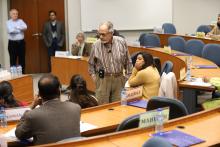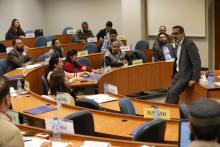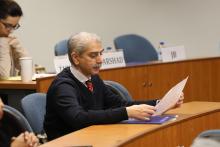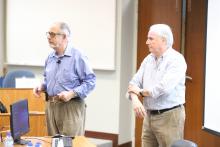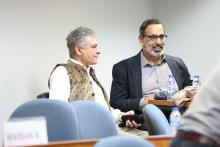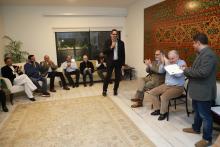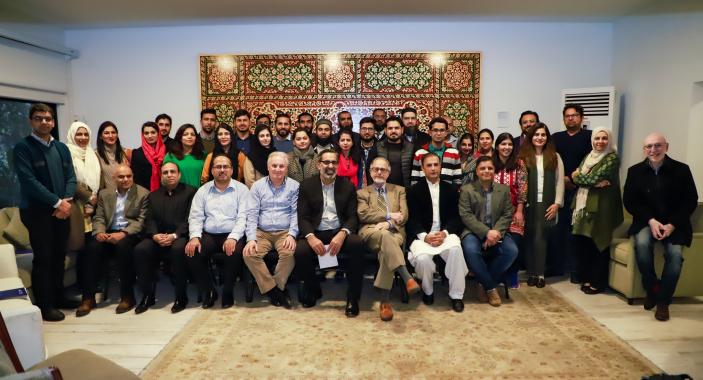
New directions redefine LUMS as Pakistan’s leading institution in research and teaching. We offer a unique experience of learning without borders through an integrated core-curriculum across disciplines, applied to solving the grand challenges of South Asia and beyond.
Students and faculty across the University work together as partners in the pursuit of excellence. In line with this philosophy, faculty and graduate students from all five Schools congregated at the Suleman Dawood School of Business to participate in a weeklong ‘No-Borders Teaching and Learning Workshop.’
The workshop took place January 13-17 with renowned international professors, J. B. Kassarjian, Professor of Management, Babson College, USA and Professor Emeritus, Strategy and Organization, IMD, Switzerland, and Joseph M. Pons, President, AXIOMA Marketing Consultants, Spain, leading it. Both Professors Kassarjian and Pons have been conducting similar workshops in over 25 countries around the world. Their unique interactive style of teaching made for a transformative experience for all those who attended.
The symposium kicked off with welcome remarks from Honorary Dean Suleman Dawood School of Business, Dr. Alnoor Bhimani and Vice Chancellor LUMS, Dr. Arshad Ahmad. After welcoming the instructors, the Dean highlighted LUMS at the forefront of learning and teaching and expressed the significance of the workshops stating, “Case-based teaching is not limited to the business school – it spreads across disciplines and is more powerful than just the transfer of knowledge.” He focused on the benefits of this methodology and said, “This will transform the way you think about teaching and will ultimately shape the lives of individuals you will encounter in the classroom.”
The VC encouraged faculty to continue availing the opportunities provided by the University in order to grow as educators, “We have to think about progress in terms of solutions and not just hope it will happen by sticking to the status quo. We have to disrupt ourselves; the true meaning of development and growing as individuals but also as a collective.”
The workshop was split into two modules: Case-based Pedagogy, which was a two-day session, and No-Borders Integrative Teaching and Learning, which was a three-day session. Participants had the option to either attend any one of the sessions or attend the full five days.
During the next few days participants delve into the art of case-based learning, case writing, and course design as well as team teaching and the impact of transdisciplinary work. The diversity of participants created space for a range of different perspectives across disciplines, schools and departments, which made for productive and thought provoking conversations. Bilal Jamil, a PhD Mathematics student talked about his experience saying, “I’ve learned a lot from the speakers as well as the participants. We had people from different levels of management; we had assistant professors, associate deans, people from a science background, business, industry, etc. All sorts of distinguishing barriers that were between us, they broke down, and by the end of the first minute, we were all colleagues and friends.”
Discussing the purpose of the workshops, Professor Pons stated, “Our goal here is to improve the quality of education. To equip people with the self-confidence of knowing that certain methodological tools achieve objectives that are more ambitious and that go beyond the simple transmission of information.” Professor Kassarjian added that the objective of the workshop is for the participants to think deeply about their teaching methodologies and what works for them, “Our main task is to provoke their thinking. That is very important to us. The way I measure the effectiveness of a programme is when we look at the feedback and they say this professor made me think in new ways. Then I think we’ve succeeded.”
The workshops highlighted interactive teaching methodologies, which gave participants the chance to focus on their specific development needs. The attendees were put in situations that challenged their teaching skills using insightful case discussions, simulations, role-play, and other work methods.
In addition to the intricacies of teaching methodologies, Professors Kassarjian and Pons also discussed the bigger issues surrounding teaching in the classroom, including the challenges of balancing a professional and personal life, and interacting with students. Dr. Muhammad Faryad, Assistant Professor at the Department of Physics, Syed Babar Ali School of Science and Engineering, expressed that the workshops have assisted him immensely, especially when it comes to keeping himself and his students motivated. The knowledge that he has acquired has helped him interact and engage with students in a way that enhances their learning.
The weeklong journey of teaching and learning ended with a closing ceremony at the Vice Chancellor’s residence, where participants were awarded certificates for completing the workshop. The VC thanked the instructors for their time and effort in trekking all the way to Pakistan to conduct the workshop and expressed hope for future collaborations. This is the second time both instructors have come to LUMS to conduct this workshop and both Professors Kassarjian and Pons spoke highly of their experience of conducting this workshop at LUMS and the interactions they had with the participants.
Professor Kassarjian ended the ceremony with profound words of wisdom for all those present saying, “I’d simply like to say that the metaphor of a journey is an appropriate one. When you start on your journey, I hope you keep discovering and keep experimenting.
